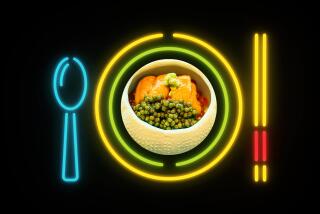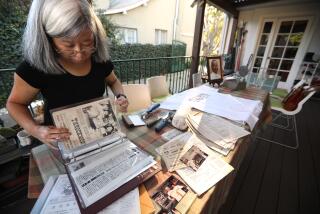A Dallas Restaurant Cashes In on Mob Connection
- Share via
DALLAS — For years, the word on Campisi’s Egyptian Restaurant was this: The pizza was good. The good fellows were bad.
Dark and candle-lit, the restaurant on Dallas’ Mockingbird Lane was a font of notoriety. The Italian owner, it was said, was linked to organized crime. Bets could be placed at the bar. Ex-cons washed the dishes.
When the patriarch was linked, tenuously, to the Kennedy assassination, few were surprised. And when umpire Steve Palermo was shot and paralyzed while breaking up a mugging outside--well, it all added up.
The family that has owned the Egyptian for four generations denied that it was in any way illicit. But nobody believed them. So they decided to make the best of their bad reputation.
They decided to market their Mafia mystique.
“Today, bad publicity is just as good,” says David Campisi. “I think to us it’s more comical than anything, but the public always ate it up. We’ve never played off it like we should.”
They hung excerpts from conspiracy novels and news clips that mention the Campisi name on the walls. A new addition is called “Joe’s Room,” in honor of one of the founders, Joe Campisi.
One framed article calls Joe Campisi a powerful mobster in the city during the 1960s. Another recounts how Jack Ruby, who killed Lee Harvey Oswald, ate at the Egyptian on the eve of the Kennedy assassination.
“The owner of the restaurant where they ate--Joseph Campisi--was well-connected with the Mafia and came to see Ruby later in jail,” wrote Robert J. Groden and Harrison Edward Livingston in “High Treason,” a novel about the assassination.
But what was the truth?
Gangsters did like to hang at the restaurant, which the Campisi family bought in 1946. And Joe Campisi was indeed a golfing and racetrack buddy of New Orleans Mafia boss Carlos Marcellos, says his family.
“They were friends. He just knew everybody,” said David Campisi, who grew up in his grandfather’s home.
“All the rowdies liked to hang here. They were all great people. I never met a bad one,” added Corky Campisi, Joe’s nephew and David’s uncle.
The younger generations concede that regulars drank, womanized and ran gambling rackets at the restaurant.
But they deny that Joe Campisi’s friendships meant the Campisis were running rackets or bootlegging themselves. Indeed, the government had a hard time proving that anything illegal was going on at the Egyptian--though they tried and tried again.
At one time, customers couldn’t enter the restaurant without being photographed by the FBI, and Joe Campisi was identified in Drug Enforcement Administration files as linked to organized crime.
“They used to trace all of our phone calls,” David Campisi said.
The House Select Committee on Assassinations questioned Joe Campisi about Ruby’s visit to the restaurant the day before the Nov. 22, 1963, assassination. He said he did not recall much, but did remember vividly that Ruby had told him subsequently that he killed Oswald to spare the Kennedy family the pain of a trial.
For conspiracy theorists, it was simple: Ruby hung out at the Egyptian. The Egyptian’s owners were said to be connected to the mob. Ergo, Ruby was tied to the mob.
But Hugh Aynesworth, who covered the Kennedy assassination for the Dallas Morning News and is now Southwest bureau chief for the Washington Times, said there was no organized Mafia in Dallas at the time.
It’s all exaggerated, Aynesworth said--but that hasn’t stopped the Campisis from capitalizing on it.
More to Read
Sign up for Essential California
The most important California stories and recommendations in your inbox every morning.
You may occasionally receive promotional content from the Los Angeles Times.










